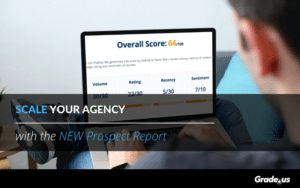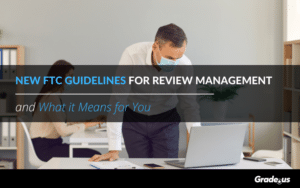It's one of the first things your real estate clients will do. Check for real estate reviews.
They may have received a referral from a close family member or mutual acquaintance. Maybe they've seen your ads online. Imagine someone is searching for a real estate agent online and types "real estate agents + [your city]" into Google, when Zillow comes up and they start looking at agents, you bet they're looking at the reviews.
Perhaps you're both in the same social circles.
They're still going to check.
Your online real estate review portfolio acts as an important measuring stick. It's a simple and objective way for clients to answer important questions and learn about your business reputation.
Reputation questions make or break client relationships
If you're a seasoned professional, this isn't a surprise. These questions are applicable throughout various service industries. Your client's most important questions typically revolve around a variation of these:
1. Are you knowledgeable and competent?
2. Are you trustworthy and reliable?
3. Are you warm, attentive, and agreeable?
4. Are you responsive, engaged and focused on your client's needs?
5. Are you an excellent negotiator?
6. Would your clients use your services again?
Individually, your clients will probably have more questions. But the vast majority of their questioning boils down to these kinds of questions. These are make or break details that determine whether you're able to attract, win, and retain your clients.
You know your clients don't want the answers from you. They want the answers from your clients. They want objective data from clients who have used your services. Research confirms this.
- 92% of home buyers use the internet in their search
- Real estate-related searches on Google.com have grown 253% over the past four years
- Buyers worked with an agent 87% of the time to find their home
- 62% of buyers choose a real estate professional based on online reviews.
- Google says 49% of real estate consumers search for trust, followed by experience, negotiation, personal references, speed and brand.
In reality (and realty), the home buying process is a bit more complicated. Today, buyers rely on both online and offline sources to conduct their research.
Here's what a joint study from the NAR and Google found:
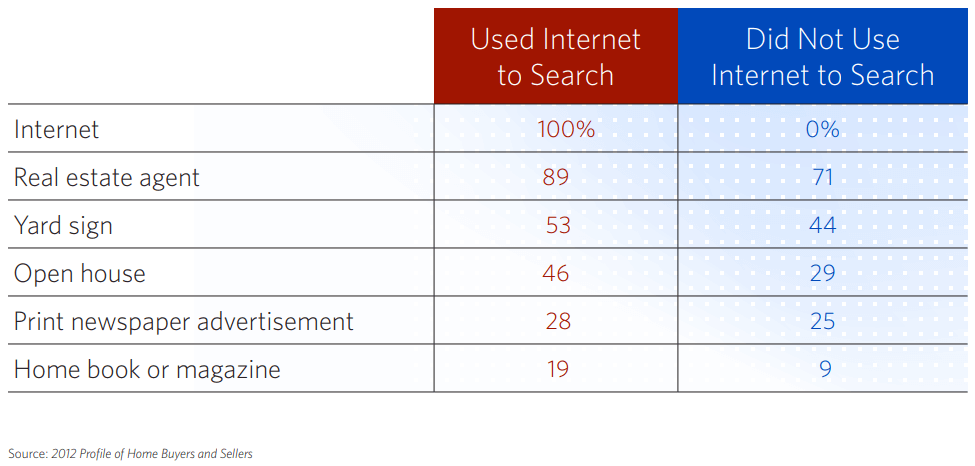
- More exposure means more traffic
- More traffic means more demand for reviews
- A strong review portfolio + the right offer = A steady stream of leads
- Steady leads + a strong review portfolio = A higher conversion rate
The data supports it. Northwestern University's Spiegel Research Center analyzed 57,000 reviews from anonymous consumers and 65,000 reviews from verified buyers of more than 13,500 unique products and services in diverse categories. Their findings?
Your online reviews can increase conversion rates by as much as 270%!
The surprising state of reviews in the real estate industry
They're non-existent.
According to Tom Ferry, real estate educator and trainer, 87% of all real estate agents fail after five years in the industry. That sounds like a harsh and very negative thing to say, especially to new real estate agents.
"Agents don’t leave the industry because they made too much money, no, they leave the industry because they didn’t make any."
~ Tom Ferry - TomFerry.com
Training is the main problem facing real estate professionals today whether you're a real estate agent, mortgage broker, appraiser or home inspector. An agent search on Zillow shows most real estate agents don't have any online reviews.
It's a disaster.
Even outstanding, well-established agents are seemingly unaware of the value that online reviews provide. These agents typically have reviews on one or two sites, but aren't visible on many other review sites. This doesn't seem to be all that important though, does it?
Isn't it all about the property itself?
Yes and no. It's true, clients focus their attention on finding the right property. But they're also interested in identifying the professionals who can help them find their dream home. Yes, some clients will do everything they can to avoid hiring an agent.
These clients aren't ideal.
If you're like most agents, you're looking for eager clients who are excited to work with you. The ones who prefer to rely on you as their trusted advisor and are willing to pay full price for your services. But this introduces a significant problem for most agents for several reasons:
1. Agents don't have a steady supply of leads.
2. Agents don't have the tools and resources they need to convert prospective clients.
3. Agents don't have a framework in place to promote themselves (or their firm).
Let's address each of these issues.
1. Real estate agents don't have a steady supply of leads
Most real estate agents and real estate professionals enter the industry with a problem. From the very beginning, agents are trapped in a vicious cycle.
- They don’t have any money
- They have zero leads
- They have little to no connections
- They don’t understand sales and marketing
- They don’t know how to sell or market themselves (not really)
This is how new real estate agents enter the industry. Sophisticated brokers know most of their agents won't survive, so they're not motivated to invest heavily in their agents' training. Successful agents, on the other hand, view new agents as competition. In their minds, sharing their strategies and tactics hurts their business.
First things first, real estate agents need leads.
Most experts will tell you that it's important to focus on high level, long-term tactics like local search or paid advertising. This is extremely dangerous for those trapped in the vicious cycle I've mentioned above. It's also a lose/ lose situation either way.
- If your ads work, you’ll struggle to convert your prospects and hurt your reputation.
- If your ads don’t work, you lose money, forcing yourself out of business faster.
Like I said, lose/lose.
Here's a six-step process agents can use to generate leads quickly.
1. Create and claim your review profiles. You'll want to create or claim your review listings on mainstream sites like:
and other industry-specific sites.
If you're a broker, you'll want to create profiles for your business and yourself. If you're an agent, create a profile for yourself on both review and listings sites. Syndicate your listings across the variety of sites I mentioned above.
Build our your real estate listings on each of these site to provide prospects with all of the helpful information that you can provide.
2. Create a compelling value proposition. Your value proposition answers one specific question. Why should I buy from you, specifically? Your value proposition has four essential ingredients.
Appeal (I want it)
Exclusivity (can't get it anywhere else)
Clarity (I understand you)
Credibility (I believe you)
This is the most difficult part of the process. It's also the part most real estate professionals will skip. Don't do it. Stick with it until you've created a compelling value proposition that includes all four ingredients.
3. Create multiple irresistible offers. An irresistible offer provides your target audience with the overwhelming incentive they need to take action on your offer. Examples include:
Discounts (90% off)
Bonuses (a free lifetime subscription to XYZ service)
Vanishing or limited offers (be one of the first 10 callers and you'll receive...)
Guarantees (I'll get your deal funded, guaranteed)
Create an irresistible offer for both your prospective clients and tangential sources. Post your value proposition and irresistible offers (for prospective clients) on the profiles you've created or claimed. You can share these details in your descriptions, as image snippets, or links to specially tailored, offer specific landing pages on your website.
4. Partner with tangential sources. Find (and meet with) mortgage brokers, appraisers, home inspectors, title companies, etc. tell them you can resurrect their dead leads, that you can put 40 to 60% more money back into their pockets without any additional effort on their part.
5. Resurrect their dead leads. Ask each of these professionals to share a list of their dead leads, prospects they've contacted in the past but failed to close for one reason or another. Tell them you'd like to help them close these lost customers. Let them know you'll do all the legwork, keep them updated on your progress, and alert them when it's time for them to step in and help you close the sale.
6. Create a resurrection sequence. A resurrection sequence is nothing more than a follow-up sequence that's designed to grab and hold the attention of an inactive prospect. Your resurrection sequence has a specific set of details included in each message (1.) An irresistible offer (2.) An urgency trigger or incentive to act now (3.) A clear and unmistakable way for these prospects to opt-out. Your communication should include these three ingredients regardless of the channel used (e.g., email, text message, phone call, social media, etc.).
Are you excited about these details, but nervous that every other agent in your office will jump on this?
Don't be.
In my experience, most of the agents who receive this info aren't willing to act on it. It's hard work, and it involves a significant amount of persistence. If you're hungry and willing to go after what you want, this strategy works like gangbusters.
What happens when this works?
You and your source close the sale. You shepherd your clients through the sales process, get them what they need, then you collect the payment for your services. Once the sale is complete, you ask your clients to share their feedback via a review.
This is crucial.
If you're already present on each of the platforms your prospective clients are using to search for a home or agent, you're in phenomenal shape.
2. Real estate agents don't have the tools and resources they need to convert prospective clients
Client retention is complicated.It's next to impossible when you don't have the tools and resources you need.
Okay, which tool or resource do you need?
You need three additional elements to round out your review management campaign:
1. A review funnel to remove friction and make the review process as easy as possible for your happy clients via SaaS software like Grade.us (shameless plug)
2. A follow-up system (i.e., an autoresponder system that sends email, text and direct mail messages to your clients automatically)
3. Your follow-up templates (see the epic email template post below)
4. A first responder to manage/respond to your reviews
The first three items are self-explanatory.
What about the last one? A first responder to respond to your reviews? Absolutely. You want to ensure that your first responder (most likely you at first) has a calm and cool demeanor. You also want to make sure you're aware of any legalities involved (e.g., the Graham, Leach and Bliley act for appraisers, the CCPA for real estate agents in California).
Here are some additional posts you can use to prepare:
- How To Perform a Review Management Audit
- The Ultimate 2021 Review Management Checklist Guide
- 6 Ways To Use Online Reviews In Marketing Materials
What about those follow-up templates?
Here are a few templates you can use to request reviews from your clients.
Subject: [Client Name], would you tell them what you really think?
Hi [Client Name],
I'm so happy we were able to help you find your new home! This property meets each of the criteria we discussed ahead of time.
While I have you...
Was there anything we could've done better? Would you be willing to take a minute and share your experience?
It helps us, but it also helps other homebuyers just like you.
[Link to your review funnel]You're the best!
[Signature]Via text message: [Client Name], did we make you happy? Was there anything we could've done better? Please share your experience with us. [Link to your review funnel]
Here's another template you can use:
Subject: [Client Name], we need your help!
Hi [Client Name],
We did it! We got you into your new home. Are you excited? I know I am.
So, I have a question for you. How did we do? Was there anything we could've done better? If you're willing to share your experience with us, I'd appreciate it.
It helps me, but it also helps others going through this process just like you.
It would mean the world to me!
Here's the link! It's easy:
[Link to your review funnel]You're the best!
[Signature]Via text message: [Client Name], what did we get right? Was there anything we got wrong? Please share your experience with us. [Link to your review funnel]
At this point, you have:
- Review management platform you can use to automate the process
- Templates you can use to request reviews from each of your clients
- Instructions and resources you can use as training aids to educate yourself and your team
It's a straightforward way to make your review platforms work for you.
3. Real estate agents don't have a framework in place to promote themselves (or their firm)
As a real estate agent, you operate in a specific locale. Your clients expect you to have a significant amount of expertise, connections and know-how. They also expect you to focus your expertise on or around a particular specialty (e.g., first-time homebuyers, sellers agent, commercial real estate, condos, etc.).
You need to be everywhere.
When prospective clients search for your name, they should see wave after wave of amazing, five-star reviews from happy clients. Your clients should run into your listings consistently. They should see the (mostly) good and bad reviews.
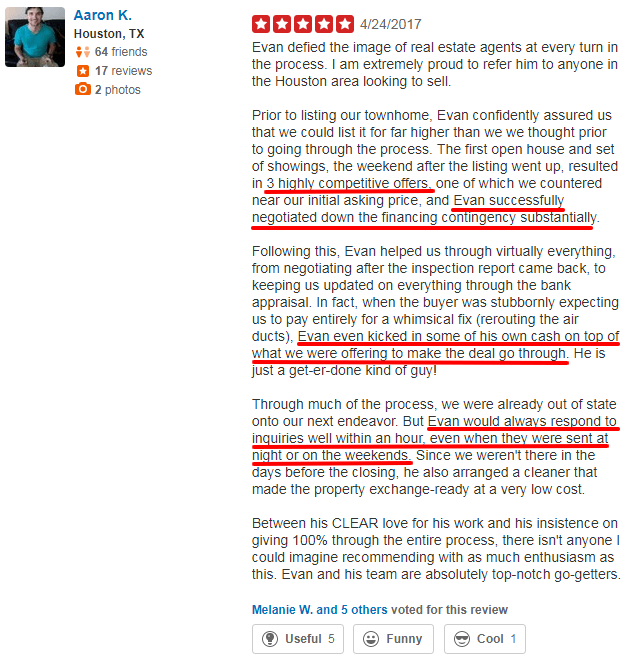
Think about it. Your clients are desperate to find the right real estate agent, yet everywhere they go legendary reviews like these bombard them. Makes it kind of hard for other agents to compete with you, doesn't it?
This is what you want.
Once you have these reviews in place at all the appropriate platforms, you should be able to promote them in your marketing.
Depending on your circumstances, this could mean:
- Promoting your reviews in your visual paid advertising platforms (e.g., Zillow, Facebook, Yelp, Waze, etc.)
- Promoting your reviews on paid audio advertising platforms (e.g., Stitcher, Pandora, Spotify, etc.)
- Pitching your expertise to local content creators (e.g., influential journalists, top local publishers, etc.)
- Publishing keyword-rich, value-driven content consistently on local, high-profile websites with significant traffic and domain authority
- Sharing aggregate review/performance data on your website (e.g., Total Homes Closed: Top 5% in this area)
- Optimize each of your review profiles
The sky's the limit here.
What about keywords? Adding keywords makes sense if you're already an established real estate agent with a large book of business. The issue here is the fact that it's going to be difficult to compete with larger firms (like Zillow).
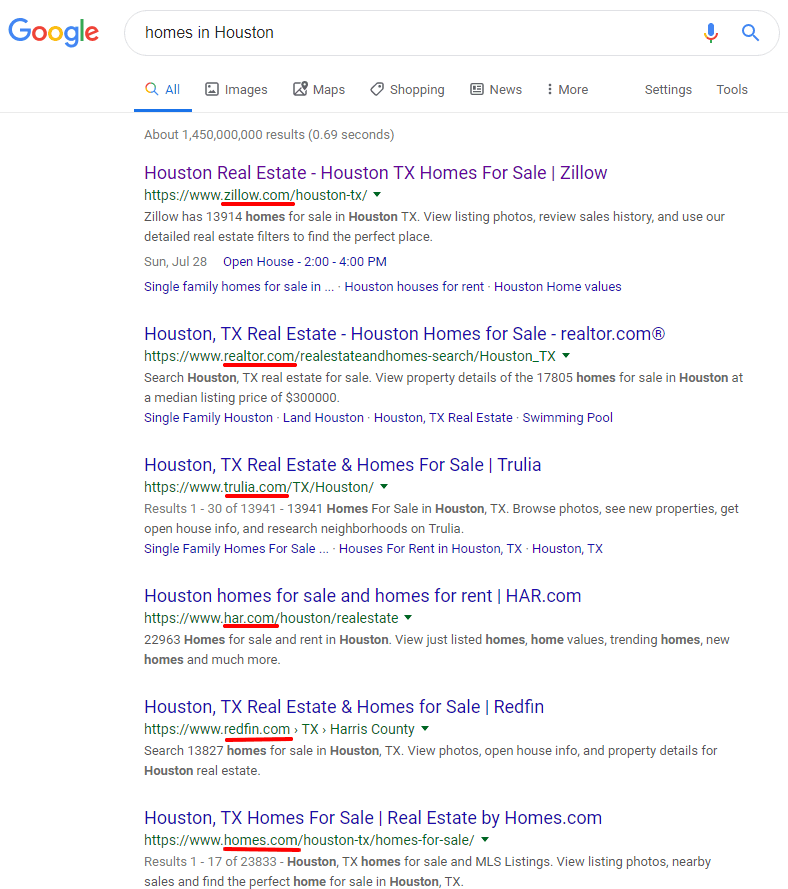
See what I mean?
Local search/keyword optimization makes more sense if you have the content + influential platforms you need to rank well.
You'll need a variety of content:
- Educational content (e.g., blog posts, videos, downloads, etc.)
- Property listings (syndicated across the top 15 real estate websites)
- Credentials, accolades, or awards (i.e., top 5 Realtor on Yelp, in this area, most properties sold in Houston, etc.)
- Optimized property and review profiles (e.g., name, address, phone, images, etc.)
- A strong review profile with a variety of five-star reviews published on multiple, high-ranking review platforms
Here are some promotion ideas you can use to attract new clients via your online reviews and review platforms.
These are the real estate websites your clients are using
As of July 2019, the most popular real estate websites in the world according to SimilarWeb are as follows:
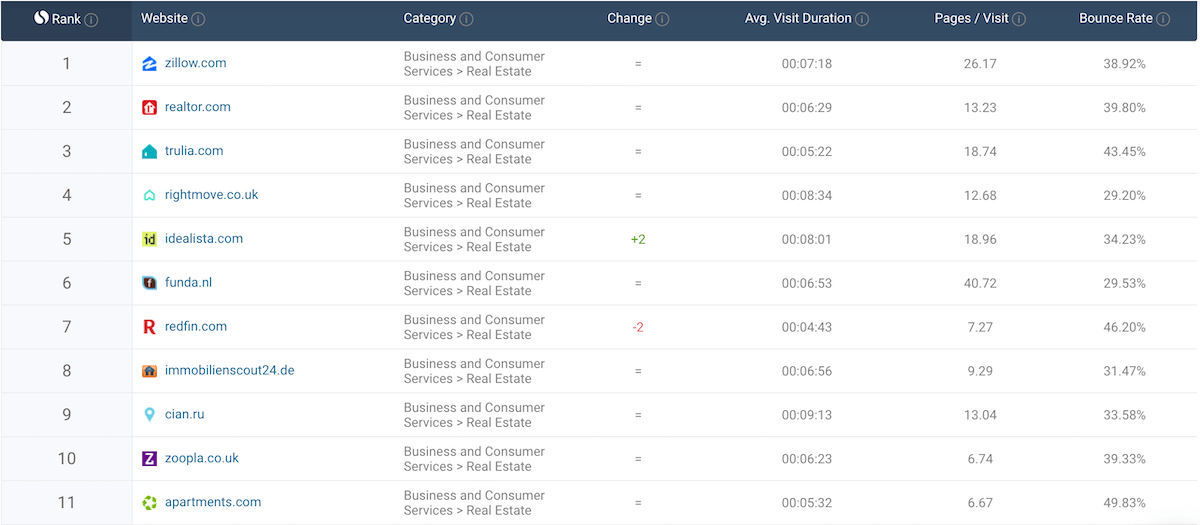
Don't forget about review/rating platforms like:
- Google My Business
- Facebook recommendations
- Yelp reviews
- Realtor.com
- Angie’s List
- The Better Business Bureau
- Zillow
Along with the sites I mentioned earlier, these are the websites your clients are already using to search for real estate agents and properties online. The more listings, profiles and reviews you have, the easier it is to generate traffic, leads and revenue.
Does this mean reviews are a competitive advantage?
Absolutely.
Evan Compean is a Realtor based in Houston, Texas.
He's also a Top 5 Realtor according to Yelp. Read through his reviews and you'll see something interesting. A large portion of his clients found him through Yelp. In fact, many of his clients reached out to his competitors first, then selected Evan after they were disappointed with their first selection.
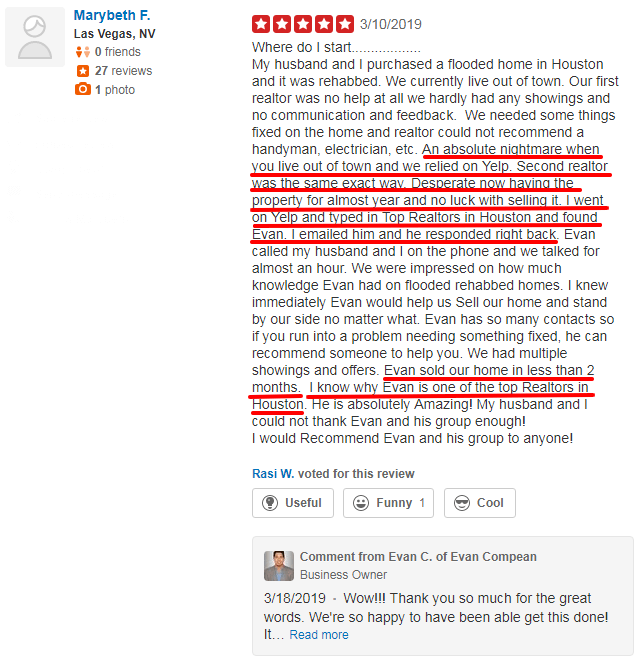
See what I mean?
Clients are using Google, Zillow, Yelp and other platforms to find and select the right real estate agent. When you're visible everywhere, you make it easy for clients to select you as their agent of record. Would other agents on Yelp with zero reviews have the same level of success as Evan?
Probably not.
The right content produces a successful relationship
Real estate clients will check for reviews.
It doesn't matter if they've received a referral from a close friend or family member. It doesn't matter if they've seen your ads before. It doesn't even matter if you're part of the same social circles. There's only one thing that matters when it comes to choosing the right real estate professional.
Your reputation.
Your online review portfolio is an important measuring stick that gives clients the objective data they need to choose you. Your clients don't want the answer from you, that much is obvious. They want the answer from your other clients.
It doesn't matter if you're new to the industry.
If you have the right knowledge, strategies and tactics, you have everything you need to attract, win, and retain amazing real estate clients. Your clients want an answer to a very simple question.
Why should I work with you?
Create the right content, provide the right answers, and your clients will have everything they need to answer that question themselves.
About the Author
Andrew McDermott
Andrew McDermott is the co-founder of HooktoWin. He shows entrepreneurs how to attract and win new customers.




